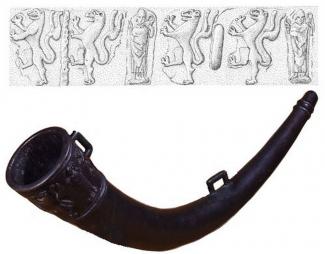The Winchester Moot Horn
Medieval, late 12th or early 13th century AD
A part of the Civic collection of the City of Winchester since the 12th century
The Moot Horn is a large and solid instrument, cast in a good-quality alloy of copper known as leaded gunmetal. It has two suspension loops for a shoulder harness, to help support the weight when it was blown. The decorative band around the bell of the horn shows six figures in relief, two standing bishops and four rampant lions. The figures are thought to represent the two principal authorities in medieval Winchester, the bishop and the king. The lions are a symbol of royal authority, and the bishops may represent St Swithun, Bishop of Winchester in the 9th century AD.
In medieval times the Moot Horn was used by the men of the watch to call the citizens together in times of danger, and to summon the freemen to assemblies of the "Burrough Mote", the equivalent of City Council meetings. The Burghmote met three times a year, when elections took place and the laws and by-laws necessary for the peace and smooth running of the city's affairs were passed. The quality of the Moot Horn's sound can be shown by flicking it with a fingernail; it rings as sweetly as a bell. A trained player can produce four true notes: B below middle C, B an octave above, F sharp above that, and a top G above that. When blown from the Westgate in the 1920s it could be heard for several miles.
The Moot Horn has been on public display for more than 100 years, and was from time to time still blown at civic functions throughout the 20th century. In 1998, a replica was commissioned, which is now blown at the annual mayor-making ceremony in May. However, you can hear for yourself the sound of the original by listening to an audio recording in the City Museum.




